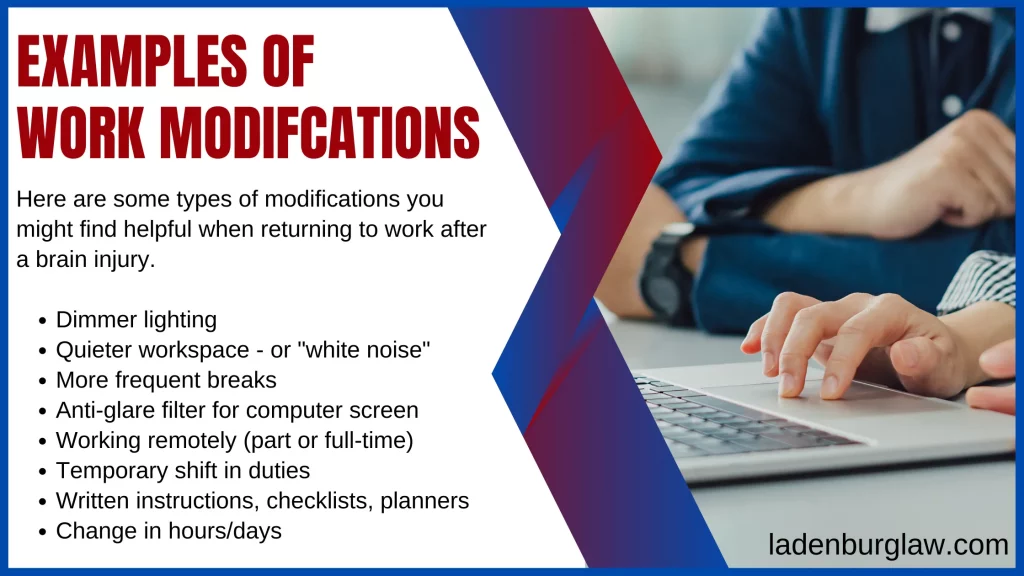Free Case Evaluation
(253) 272-5226Free Case Evaluation
(253) 272-5226Your life changes in many ways when you’ve been diagnosed with a traumatic brain injury (“TBI”). Understandably, you may want to know how to safely get back to your pre-injury life. Returning to work after a TBI can help you regain a sense of normalcy. Some doctors now believe that a push to return to work can help brain injury victims recover quicker than total bedrest.
Before we get started, we need to make a quick disclaimer. We’re injury attorneys, not medical doctors. While we have worked with many clients over the years who’ve had brain injuries, we can’t provide medical advice. So, take this blog post as general information only. As always, seek targeted guidance from your doctor.
Returning to work is an important rehabilitation goal for many TBI patients. Perhaps it’s one of yours, too. As we mentioned earlier, some studies show that getting back to your work routine can help your recovery, too.
However, you may be facing some TBI symptoms that could make returning to work feel challenging. For instance:
Depending on the scope of your work, these symptoms may range in their impact. You may need to consider these symptoms with a doctor as you map a plan for returning to work. But remember, it’s possible that the symptoms you are experiencing now are temporary or will reduce in their severity over time.
How soon you return to work following a TBI will depend on several factors including the severity of your injury, which parts of your brain are impacted, and the specific demands of your job. Often, TBI victims will return to work gradually. This is the approach recommended by the Brain Institute of America.
A gradual return to work could look like working two or three days a week initially, to allow ample time for you to rest and adjust. Sometimes, a trained vocational counselor can intervene and help you and your employer navigate this transition.
No matter what, this decision should be made between you, your doctor, and your employer.

It’s possible that you may struggle to perform your job in the same way you did before your TBI. Depending on your job environment, you may need to ask for work modifications. This is particularly true as you ease back in.
Some examples of work modifications could be:
We hope that your employer is sympathetic and supportive of your return to work following an injury.
There may be situations where it’s just not feasible to remain in your same line of work. Perhaps you worked as a manual laborer in a physically intense role. Or maybe you were a manager overseeing many employees, tasks, and deadlines. Sometimes, it’s not possible to modify your duties to an acceptable level.
When this happens, we encourage you to reach out to your loved ones, doctor, employer, and vocational counselor for guidance. It may be time to consider new employment options.
Your TBI may be a qualifying condition to receive disability benefits through the Social Security Administration (“SSA”). As these applications can often take months to process, we recommend that you apply sooner rather than later.
These benefits could be temporary, to help cover expenses while you recover. Or they may be long term if you’re unable to return to work.
As you might imagine, this is a very big topic – one that could likely have its own blog post. If you would like more information on how to access these benefits, the best source is the SSA website.
Not every brain injury is grounds for a lawsuit. However, if you can pinpoint someone else’s misbehavior as the cause of your TBI, you could be eligible to file a personal injury claim. As an example, if a driver ran a red light and struck you, they could be held accountable.
Please reach out to our injury attorneys for help. We offer free case evaluations. In other words, you can tell us what happened, and we’ll let you know if we think you have a case – at no cost to you. In the event you do have a case, you may be able to collect a settlement that could help cover your medical bills and missed time from work. This could greatly ease your worries as you fully return to your job.
Here is a short video on this topic (not produced by Ladenburg Law, however), that shares more on this topic: